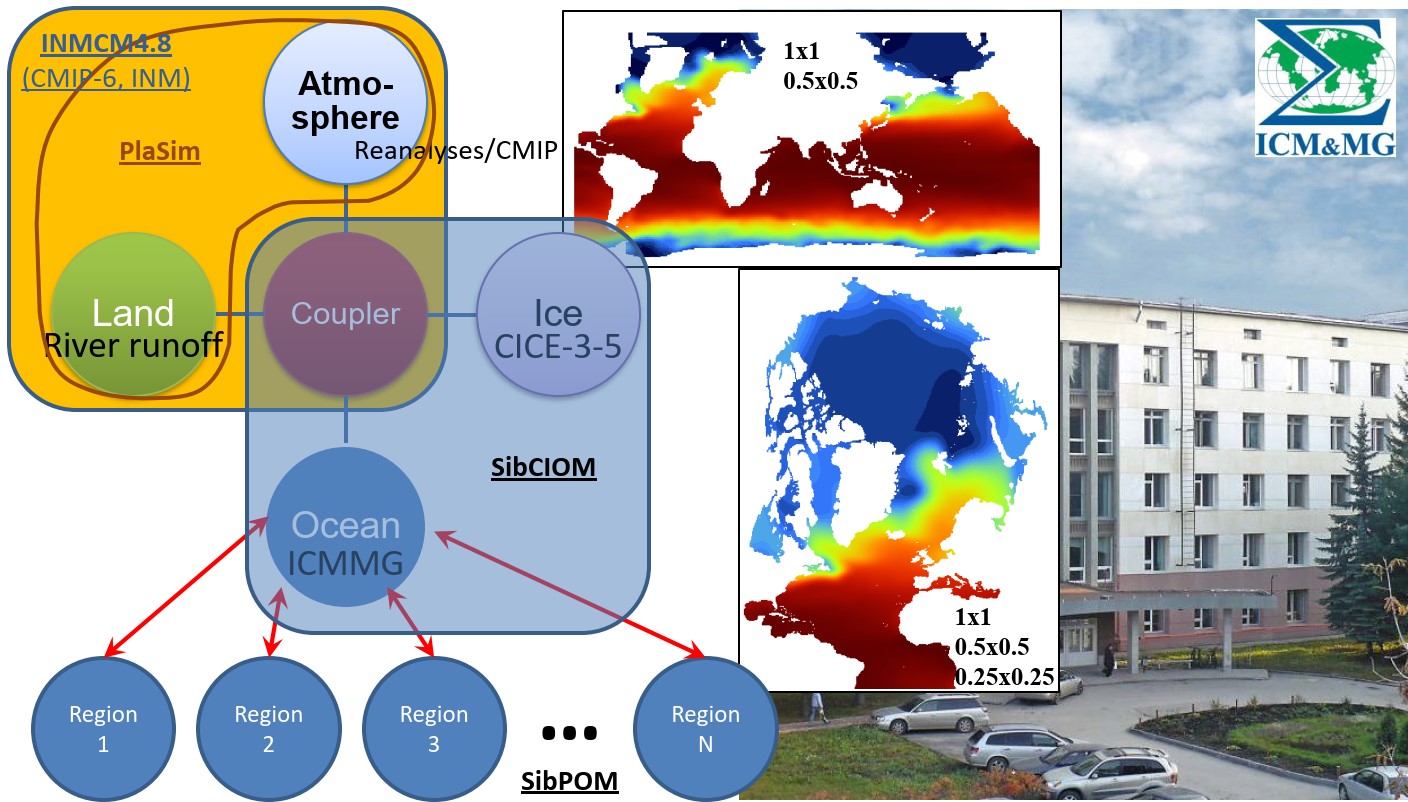Project Description
The Institute of Computational Mathematics and Mathematical Geophysics (ICMMG, city of Novosibirsk, Russia), Siberian Branch, Russian Academy of Sciences (SB RAS) as the Partner of the Horizon-2020 CRiceS (https://www.crices-h2020.eu) project applied for national funding and obtained financial support (about 30M Rubles; for 2021-2023) from the Ministry of Science and Higher Education of the Russian Federation. The Russian national project became the Sister project to the CRiceS. The ICMMG team (led by Gennady Platov) includes 14 scientists, experts in numerical modelling of climate system and its components with the focus on Arctic region, subaqueous permafrost and methane hydrates, inverse and ill-posed problems in socio-economical modelling.
The ICMMG team will focus on analysis of climatic changes occurred during the last century. Analysis will be based on long-term observations in the polar regions, identification of atmospheric circulation modes, their trends and construction of synthesized forcing for tests on sensitivity of the climate system relative to disturbances. ICMMG will perform a series of numerical experiments (using the SibCIOM model for the “historical” period) and analyse results, including analysis of a sensitivity of the climate system in relation to individual disturbances of circulation modes. The circulation of the Russian Arctic seas and their variability (depending on climatic indices such as NAO, PDO, AO) will be also analysed.
The numerical experiments with the PlaSim-ICMMG climate system model will be carried out, including testing (and verification) of new and improved parameterizations of processes in polar latitudes developed in the CRiceS project. Similarly, experiments with the regional models of the Arctic seas (SibPOM) will be also performed, parameterizations tested and verified. The focus is also on identification of the main circulation modes for the Arctic region and for individual seas and their interconnections, as well as on analysis of the main trends in the Arctic climate in the last century and in the future. It will be done based on results of the IPCC scenario calculations and on basis of resulting decomposition of the state into modes (PliSim-ICMMG, SibCIOM).
Moreover, the relationship will be revealed between climatic trends and reduction of the Arctic ice cover with a rate of degradation of subaqueous permafrost and methane emissions into the atmosphere. Tasks will include also numerical reproduction of typical circulation patterns for the Arctic seas using a series of high-resolution SibPOM regional models and analysis of the simulation results obtained.
In addition, new Russian model of the Earth’s climate system (INMCM- SibCIOM), elaborated on a basis of existing INMCM (Institute of Numerical Mathematics Climate Model) model developed at the INM RAS, will be tested with including the coupled ocean and ice model SibCIOM and using improved/ new parameterizations developed in the CRiceS project. A series of verification experiments will help to compare with original version and to develop a set of recommendations for improvements, including modelling strategy on usage of detailed descriptions of processes in polar latitudes.
The ICMMG modelling results (for the Arctic and Arctic Russian seas) will contribute to the CRicesS project database for cross-comparison with results from other models utilized by different Partners in the CRiceS. The project promotes the open data access policy and FAIR principles to all generated data by Partners. A developed interface and a set of services will allow direct and remote work with the modelling results.
The ICMMG team will create and implement integral mathematical models connecting socio-economic processes with climate and biosphere. Based on the solution of inverse problems, the identification of the main parameters of these models will be carried out according to observational data over the past 50 years. This will allow assessing the change in parameters over time, constructing various scenarios taking into account a desired direction of economic development, and also assessing the consequences of predicted changes.
Text by Gennady Platov, Vladimir Krupchatnikov, Elena Golubeva (ICMMG SB RAS)

